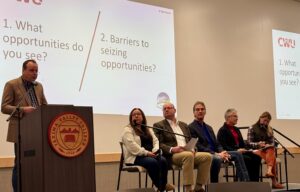Last month, I traveled to Washington, D.C. with a group of local partners to talk about something we all rely on—but too often take for granted: transportation infrastructure. When it works, it fades into the background. But when it’s outdated or incomplete, it holds communities back.
Two regional coalitions—TRANS-Action and DRYVE—have helped prioritize infrastructure projects that will move the Yakima Valley forward. TRANS-Action focuses on urban mobility in the greater Yakima area, while DRYVE (Developing Rural Yakima Valley’s Economy) champions rural access. Both coalitions include local governments and private businesses and the Yakima County Development Association (YCDA) is an active partner in both.
Our message in D.C. was simple: infrastructure is economic development. When we invest in roads, trails, and transportation corridors, we’re investing in jobs, businesses, and the long-term vitality of the Yakima Valley.
Here are the key projects we discussed and why they matter:
- I-82 Yakima to Union Gap Corridor – As traffic increases along this stretch of freeway, congestion and safety have become growing concerns. This fully funded project will widen I-82 between the US 12 and Nob Hill/Highway 24 interchanges to reduce collisions and support growth in the region’s commercial and industrial sectors.
- Regional Beltway Connector – This project links the Yakima Air Terminal via Ahtanum Road to the newly improved South Union Gap I-82/US 97 interchange. It will give freight traffic a route around Union Gap’s downtown core, reduce congestion near schools, and improve pedestrian access to Fullbright Park and the Central Washington Agricultural Museum.
- Naches Avenue Extension (Fruity Pebbles Project) – Selah’s First Street is the second-busiest roadway in the county. This project will extend Naches Avenue through the fruit processing district and across the Yakima River to Exit 29 on I-82 by the gravel quarry. It’s a needed route to ease congestion and support Selah’s continued growth. The project’s nickname comes from combining the industries at either end of this new route, fruit and gravel: Fruity Pebbles.
- Heritage Connectivity Trails – A partnership between the Yakama Nation and WSDOT, will create more than 150 miles of walking and biking paths between Union Gap, Mabton, and White Swan, connecting cities and towns along the way. A $1 million federal grant is funding design work for the first 23 miles. The trail system will tie into the Yakima Greenway and improve transportation access across the region.
- Cheyne Road Widening – With the Terrace Heights Landfill expected to close in 2031, Cheyne Road north of Zillah will become the County’s main garbage route. As the corridor takes on more heavy traffic, this project will widen the road, add sidewalks, and improve safety for drivers and pedestrians on the section of road within the City of Zillah.
- US 97 Safety Corridor – Between Union Gap and Toppenish, US 97 sees high volumes of freight and agriculture traffic—and a high rate of accidents. Three roundabouts have already been completed, a fourth starts construction this summer, and three more are planned. Once finished, this corridor safety project will reduce collisions and keep the corridor moving safely and efficiently.
These projects aren’t just about improving commute times. They support local businesses, reduce barriers to job access, and position the Yakima Valley for long-term success. They’re community-backed and essential to a stronger, more connected future. Let’s keep the momentum going—because a stronger Yakima Valley starts with stronger infrastructure.
To learn more about DRYVE and TRANS-Action visit www.dryvetransaction.org.
This monthly column, authored by Jon Smith, Executive Director of YCDA, published in the Yakima Herald-Republic. You can read it online here.


